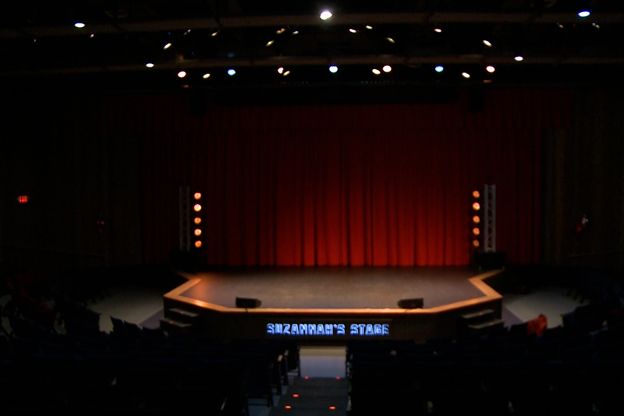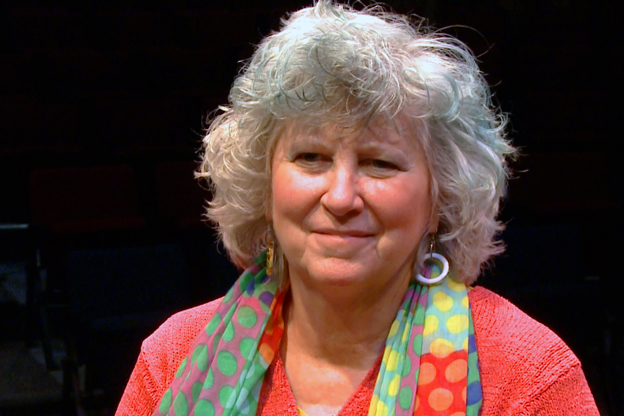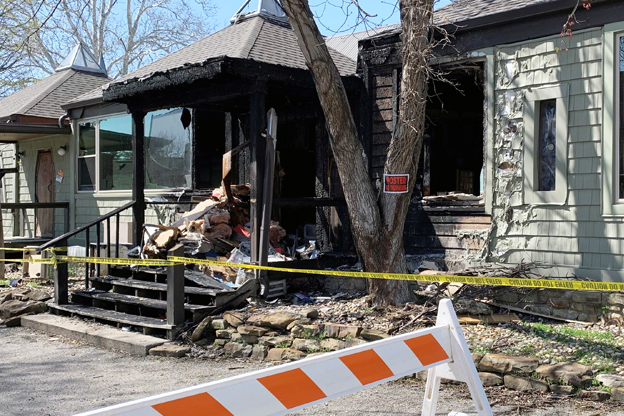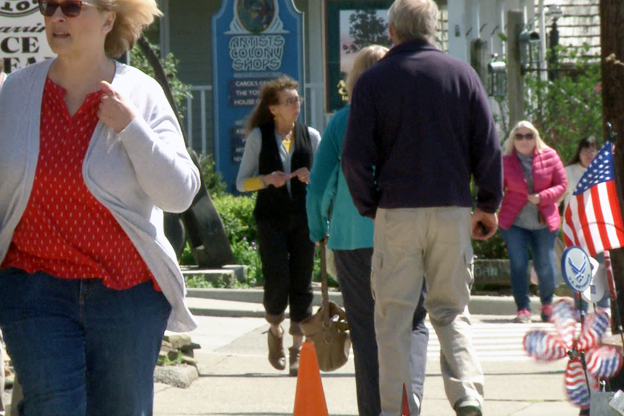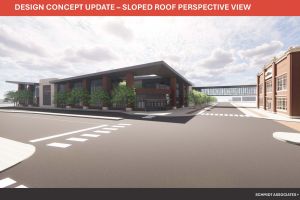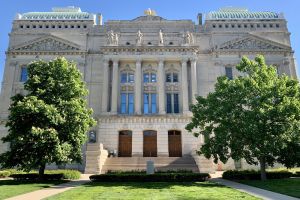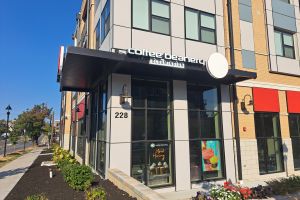Hello and welcome. This is the Ask the mayor program on WFIU I'm Joe Hren with WFIU WTIU news this week. We are in person in Nashville. And with Nashville town council President Nancy Crocker. Hello and welcome. Hello.
Unknown Speaker
Welcome to the Brown County Playhouse.
Unknown Speaker
Yes. And that was my next thing. We are on location actually at the Brown County Playhouse. Yes, a wonderful venue I was just telling you before we sat down. I remember coming here back when I you did their summer productions here. And it's so nice to be back and see it. It's all lit up. For those of you who can't see it on the radio right now. It looks wonderful. There's been a lot of upgrades, a lot of upgrades and tell us a little bit about what's happened these last few years. Well, we
Unknown Speaker
have we have a brand new director, her name is Amanda Webb. She's doing a fabulous job. She has kind of steered us through COVID. And Hannah, the director before that kind of got things started but Amanda has taken over through COVID We've we had to close down so they used it as an opportunity to upgrade some things. We have a bigger stage we have new lighting, we have new sound system. We have lots of bells and whistles that we can offer people when they come here. In fact, we had a Acrobat team not long ago hanging from the rafters so so we can offer a lot of things we have a partnership with the art associates that we also have an art gallery that is here in the Playhouse and a man is bringing in all kinds of different things from the band on Saturday was a little punk rock. And from that to Barefoot in the Park play that's coming up. So all kinds of fun stuff going on at the Playhouse.
Unknown Speaker
I want to remind everyone you are always looking for your questions or comments, you can submit them to news at Indiana public media.org or on Twitter at Ask the mayor. This venue though has quite a history though it goes back quite a few years. Can you tell us a little bit about how it started and how it came to be?
Unknown Speaker
Well, it's I think it's now 75 years old, started with Andy Rodgers vision. And it was a stage and dirt floors, people would bring their chairs to watch. And it's evolved now into this, which is you know, a very much a staple part of the tourist industry here, which is our only industry. And so the playhouses has guided that along the tourism part of it. And being here and now the Playhouse now is nonprofit, they have their own board. So even though this is a huge part of the tourist industry in the community, it still the money that it generates, doesn't really fall over into supporting the community. Since it's nonprofit, they don't really pay property taxes. And in any of their profits, none of that goes back into the tourism industry. So it's it's this we're in a little bit of a different call difficult kind of town, whereas we've got the community and we have residents here that live here that we need to support and we need to you know, fund the infrastructure for that. And we've got this huge tourism community, but really the money that it generates doesn't do anything to help the town, the town gets no money from the tourism industry. Now, there are some taxes like the lobby or the lodging tax. But it goes to promoting the tourism. So the food and beverage tax goes into supporting the restrooms and the parking lot for the tourists. So so we really would like to urge the legislation of the state of Indiana to look at towns like ours, and be creative about how things are taxed. That you know, we don't have enough money. We've talked I think last time about our police department. Can we have a public safety tax? Well, it's not allowed in the state of Indiana, but it would be great for us and we could we could hook it on to retail sales or something like that. So whereas we love our tourists, and we love our art colony that started in the 1920s by Tc steel, it does put a burden on the community and on the residents here. It also gives people jobs so that's a that's a good thing. So um But the the weight of the, you know, the roads and the structure and the infrastructure and even the hotels that use water and things like that the water system that feeds those hotels, you know, no money comes to us from the tourism industry to support that. So. So it's a, it's a real delicate balance and a very much of a challenge in this town.
Unknown Speaker
What's your reaction to this, the fact that the state is trying to if anything, cut taxes to towns and cities, there's a billion dollar surplus, and people are getting refund checks, but yet, they wanted to cut the personal property business personal property tax, and they talked about cutting the food and beverage tax to two cities sunsetting some of those in the next few years. But towns like Nashville rely so much on
Unknown Speaker
that. Absolutely. We do. So we rely, we were successful. They renewed our food and beverage tax for I think 20 years. Yay, we appreciate our lobbyists that helped us helped us do that. And any anybody that voted yes, for it, thank you so much. So yeah, again, it, it's almost feels like and I'm gonna say feels like because I'm not going to give you any valid things to back up. But it feels like the small towns are not appreciated. And in the political realm of Indiana. And, again, like I said, last time, you know, John, John couverts talks about the small towns in Indiana, and they are they are important to Indiana, and our little small town. Our problem is, the people of this town want to keep it a small town, they love their small town. But unless we grow or unless we do something creative to bring money, and we don't we don't have enough money to support the infrastructure for a small town.
Unknown Speaker
So come back to the Playhouse or a venue like this, and to see it grow and get new seating and new lights and sound system and have staffing. How does it survive?
Unknown Speaker
Barely, barely, you can a man I'll tell you that barely survives many of the shows they lose money on because of the the, you know, the support staff and the heating and the just the the mound of money it takes even for us to be sitting here on stage with the lights. So yeah, they, they, they barely make it. So you know, we really rely on people from outside of Brown County, to come to this county, and spend their money and go to shows and things like that. Because, you know, that's the only way we can keep the doors open on some of these things that are important, not only just to Brown County, but to the state of Indiana. I mean, this place is 75 years old. That's it's it's a historic part of Indiana, it's part of our history, and TEC steel in the art colonies part of our history of of Indiana. So it's important to to value those and keep them going. But again, without without money to support that infrastructure around there. You know, it's gonna go away if we can't, if we can't somehow support the people that live here, then we can't support the tourism, either. Because
Unknown Speaker
so do you have some numbers for us to to help? No sense about, like, you know how much it takes to run a venue like this per month? And what
Unknown Speaker
I mean, I can holler at Amanda, she can come down and she's up there, but because she knows that stuff, I don't I don't I honestly don't have numbers like that.
Unknown Speaker
But now there was something I thought I saw about the innkeeper tax and some money coming to promote this venue. Is that still in the works?
Unknown Speaker
I did you know what, I was gone for a while. And that was when the meeting was so I'm not sure if that happened or not. Okay. And again, I could holler at her right now and get her down here. And she could tell you, but and she'd be glad to but yeah. But I know, you know, we have to be careful with the parameters of that innkeepers tax to to make sure that the parameters are being followed, because like the food and beverage tax, that's one reason that it was it was like, some people were saying, Now we don't want to do that because and I don't again, I don't know which community it was, but somebody wouldn't use in their food and beverage tax right? And then that that makes it volatile to all of us. So so we need to be good stewards of that money too. So I'm not sure if they ended up getting anything or I'm not sure if the parameters allowed them to get anything. I know they got some nice money from like some grants and things like that recently through the COVID money that came down and stuff like that which in enabled them to get some new sound systems and things like that.
Unknown Speaker
So I did see Brown County Commissioners receiving 3 million in that what you're talking about the American rescue plan Act, the town is getting some to, has that been allocated?
Unknown Speaker
Yes, where that's gonna go right to our wastewater treatment upgrade.
Unknown Speaker
Okay, and what's the process? And how does that work?
Unknown Speaker
Luckily, I have a great staff that knows all that Brenda Young as our town clerk, and she's going to be the one of funneling that money. I know that just today, I got an email saying that we needed to sign something for the SRF you know, money that we were going to be allocated. So it's, it's basically just, here it is, here's the parameters. Follow up, tell us what you did. Blah, blah, blah,
Unknown Speaker
do you know what it's going to go into help do is just helping to expand, fix everything.
Unknown Speaker
Primarily, that money is going to fix and repair. We've, we've got some things that aren't really up to code, I think code is the right word to use for it. And, again, these guys that are working in the utilities are that have been working, we just hired a new utility Manager, which is a game changer. And again, we talked last time about the utility board, another game changer to help the actual workers out there, take some burden off their backs so that they can actually work. Most of the time. They're, they're chasing repairs. So the thought of okay, let's make a plan to do this. They don't even have time to think about a plan. They're chasing repairs. So that's what this money's gonna go for a lot of repairs and just bringing things up to code, making sure things are right, we're waiting to hear from the state, if they're going to give us some more money to completely overhaul the whole wastewater treatment plant. So we're hoping in July that we get some of that millions of dollars that is coming down through federal money, because it's supposed to be focused on lower income communities. So and we are, we'd looked up a while back, the mean income for somebody living in Nashville is 19% below poverty level. So we're going to call a fie. It's not a, you know, proud thing to be able to qualify, but we're, we're going to qualify because of that.
Unknown Speaker
You said earlier talking about you wish you had a public safety tax. And it reminds me of last month, when we were talking on Zoom, there was a fire downtown and volunteer fire department that happened to be at the fire department. Someone happened to see the smoke or the flames and called it in and they were able to get there. I remember you said something. We're lucky. Yeah, it could have been much worse. Yeah. So can you talk a little bit about what you could use in the fire department here?
Unknown Speaker
Oh, money. We could use more workers. The you know, you can, but and I think just recently, we have gotten a bunch more volunteers trained. I know, two friends of mine just got trained to be volunteer firefighters, and one of them went to EMT school. So that's really helpful for us. Yeah, I mean, we're looking at a lot of that, at the same time as doing all this other stuff. If we could switch over to a fire territory, that would enable us to bring in some money and so that we could possibly have a paid Fire Department. So, you know, everything just goes back to money. It does. But, again, a public safety tax, a tax on cars going into the state park, that would would be specifically used for public safety or infrastructure or whatever. That would be really great and really helpful to be able to have something like that.
Unknown Speaker
Just a quick follow up on that fire. Was there any cause or anything come about? You
Unknown Speaker
know, I don't think they've said anything yet. They and they may never know. Yeah. I think if it had been arson, if it had been this or that, or electrical or whatever, if they could have pinpointed we would have known by now. But I haven't heard anything.
Unknown Speaker
You said it could have been much worse. Why in Nashville could that have been much worse?
Unknown Speaker
Our buildings are very old. They when Nashville was kind of coming about there would be one building and then they build another one right next to it and another one right next to it. So so we're we're kind of, you know, a little what's the word now? volatile, I guess volatile is the word for it. So and we're all smushed in here into the town. So if one building burns, another building burns, another building burns. Again, if it had been windy that day, it could have been a lot worse, you know, cause fire jumps. So
Unknown Speaker
any town council meetings coming up, what's what's on your agenda?
Unknown Speaker
We just had one Thursday, last Thursday, we did a first reading of a human rights ordinance. I'm very excited about it, we had five people on an advisory committee, look at everything that they could possibly look at, I got in on some of those meetings, and they were fabulous. They they went way beyond what we asked them to do. And what they came up with is we don't have the structure to like, have any type of really Human Rights Commission, per se. So what the ordinance has in it is very simple. It says, all people should be created or treated equally, no matter what, with a lot of words that say that. But then their job is if there is a complaint, they would be available to direct that complaint to the state of Indiana to the civil rights organization in the state of Indiana, they would not be doing any counseling, we don't, we can't train people. You know, it just isn't feasible for us as a small town to do that. And that's what the advisory council came up with. So that's, that's one of their primary roles. And then the other one is just to be aware of the changing environment. And if there's new things that come up, to educate the Council on things that are happening in the environment, educate them about, you know, different holidays, like for instance, Jim teeth, teeth, I'm going to be honest with you, as a, as a white woman living in Indiana, until two years ago, I had never heard of that holiday. And that's terrible. And so there's they're there. So their primary job is to, to facilitate when there's an issue, and, you know, send them the right direction. And then to educate. It's a very, very simple ordinance. Very nice, little ordinance. But the bottom line is, there have been some things in the past that haven't looked pretty for Nashville and Brown County, and the town wants to make a stand and say, you know, we want to make sure people know that that's not what's going on here as a whole. And we want to make sure people are treated equally. So I'm excited about that. So we did a first reading last month or last Thursday on that. And it's really important to me to hear what people say, but people's thoughts are I just got an email today from somebody saying, I think the ordinance is great. Keep doing what you're doing. So instead of, you know, speeding up the process, my thought was, let's slow down. Let's do a first reading. Let's let people comment. And then as long as we get good feedback, then we'll pass it at the next meeting.
Unknown Speaker
Then that, you know,
Unknown Speaker
that is the third Thursday in May. Okay. Yes, that'll be okay. That I guess our council meeting wasn't last Thursday, it was the Thursday before but anyway. We are going to No, it was less Thursday. I'm sorry, the day school. Then this coming Thursday, we have a town hall and our so so you have town council, then you have an off week. And then you have town hall. And this one is going to be focused on infrastructure. I'm meeting on Thursday with my consultant Dex Norton. And we're going to kind of get an outline of what we're going to say. But we talked about economic development at the last one, this one is going to be more focused on infrastructure focused on what's going on with the wastewater treatment plan and the and the water plan and some things like that, even sidewalks, roads, things like that. And, you know, we've, we've gotten great, we've had great attendance, you know, I'd love to have three times as many people as are there, but we've had great attendance and some really good ideas have come from these meetings. So it's just a place for us to just talk. So that's good. And then I actually just talked to Tyra Miller, she's another one that council people think that the next town hall and June is going to talk about the noise ordinance that she's working on. Very controversial ordinance. Everybody has It's a different opinion. So we want to make something that at least everybody can compromise on. And, you know, you can be happy at home and you can have a business that has good music. And hopefully we can find a middle ground on that. And she's taken the lead on that. I'm letting her do it. And so I think we'll probably we'll use that townhall to let people come in and talk about that. At that point. Yes, I
Unknown Speaker
guess. Well, we're almost out of time. But I did want us this is my first time back here in a while and just driving around it looks like storefronts are full. People are here. I don't see many empty areas. I'm sure there's some yeah, there's some but not a lot. Yeah, I was gonna say so did things pretty much pick back up after the pandemic?
Unknown Speaker
Oh, my gosh, it was like craziness. Like once once, it was like, Okay, you can come out of your house now. Our hotels were full the next weekend. Like it was it's been and it's been that way. So we so appreciate. I think people have just realized that you don't have to travel miles and miles to have a good time to be able to in your brain get away. It doesn't have to be that far away from home. And so yeah, I think a lot of people have come back a lot of families have found us and and just the gallery that my art is in we we've noticed even through the winter having better sales than we have before. So things that in that respect. I think things are going pretty good. And we've got the music center out there bringing in people we've got JD Simmons, come in here we have Leo Kottke, I think is how you say his last name come on this. That's this week. And pretty soon. We've got Pat Benatar come in well, Winona Judd is in two weeks. And so we have lots of really cool things going on. And we've got an amazing community of bikers. Now we have a great bike shop over here that they've really kicked up the notches on that to to bring bikers into the community. bicyclist bikers. We also have a great community of biker bikers to that common, you know, spend their money here, and we appreciate that too.
Unknown Speaker
And see, thank you so much for having us. Really appreciate it. Thank
Unknown Speaker
you. Thanks for coming and being on site. We'll see you next time.







